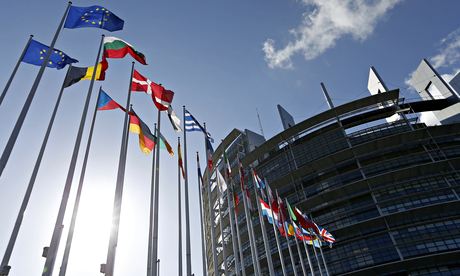
Flags of European Union member states fly in front of the European parliament building in Strasbourg. Photograph: Vincent Kessler/Reuters
Anti-EU parties could win more than 30% of the vote across the continent in the European elections, according to calculations by the Open Europethinktank, up from 24.9% on the vote in 2009.
The calculation – challenged by other analysts – suggests hardline sceptics could take as many as 218 (29%) of the 751 available seats, up from 164 out of 766 (21.4%) in the current parliament. Open Europe says this bloc is diffuse, ranging from mainstream governing parties to neo-fascists.
It forecasts that the European parliament will continue to be dominated by parties that favour the status quo or further integration, although their vote share is set to fall slightly.
The vote share of parties identified by Open Europe as being "critical reformers" – parties such as David Cameron's Conservatives, who believe the EU needs fundamental reform if it is to survive – is set to go from 53 to 39 seats. The projections are based on figures compiled by Vote Watch.
The thinktank argues that, paradoxically, the net effect of the anti-EU vote could be to make the parliament more integrationist as critical reformers will be crowded out, with the parliament and European commission bound together to resist the anti-European tide.
If voter turnout is 43%, roughly the same as in 2009, Open Europe estimate that 74.4% of all voters will have either voted against the EU, for radical change or not bothered to vote at all, with only 25.6% of all eligible voters actively voting in favour of status quo/more integration parties.
"For the European parliament to pursue an explicitly integrationist agenda on such a thin public mandate would not be democratically honest – and would most likely serve to fuel the anti-EU vote even further," Open Europe said.
Included in the anti-EU bloc as defined by Open Europe are parties supporting withdrawal, fierce EU critics including opponents of free movement of workers, neo-fascists, left anti-capitalists such an unreformed communist parties, anti-establishment parties such as Bepe Grillo's Five Star movement in Italy, and conservative nationalist parties.
A more narrow definition of anti-European parties taken by the research organisation Absolute Strategy produces a more modest 18% EU-wide vote for opposition to the bloc, still far higher than the 8% polled in 2009. Absolute Strategy excludes some of the most populist anti-politics parties as well as some nationalist parties.
Open Europe and Absolute Strategy both agree that the anti-EU vote spanning left, right and populist will not act as a coherent bloc.
Open Europe's critical reformers category contains the bulk of Conservative MEPs, the Dutch VVD and the German CSU. This does not mean that the parties Open Europe has identified as status quo, such as Labour and the Lib Dems or Angela Merkel's CDU, are completely opposed to EU reform; the difference is that the critical reformers believe the EU has wider structural flaws that need to be addressed, while the status quo parties favour more limited and targeted reforms and are generally less willing to force the issue.
Since direct elections were introduced in 1979, turnout has fallen from 62% to 43%, in part reflecting a wider electorate as the EU has expanded beyond the core group of EU nations, bringing in countries with low turnouts such as Slovakia.
No comments:
Post a Comment
thank you for your precious time and feedback.